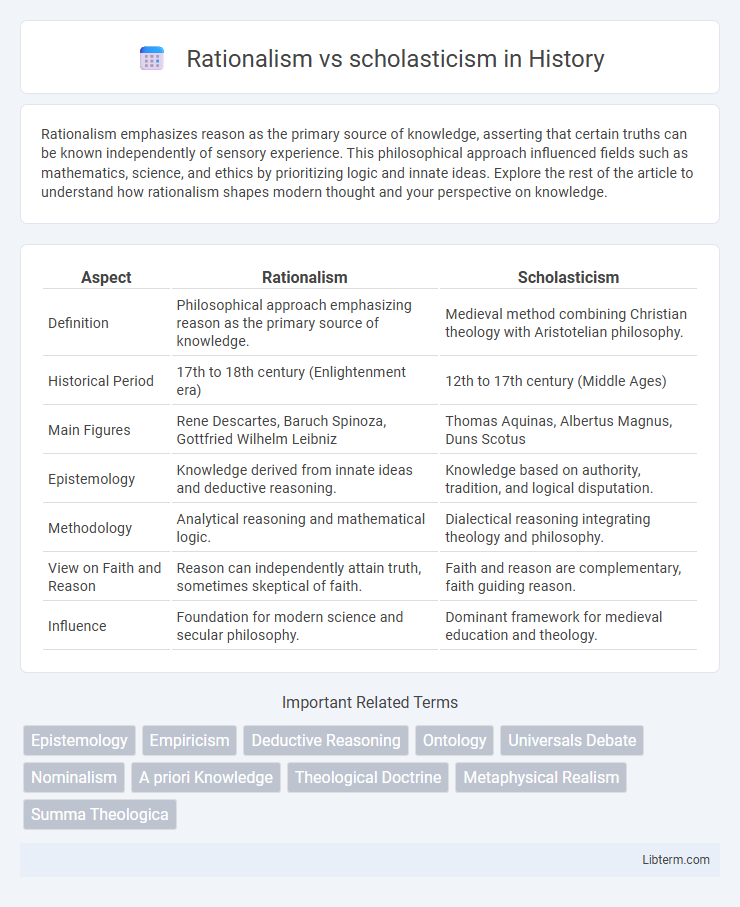Rationalism emphasizes reason as the primary source of knowledge, asserting that certain truths can be known independently of sensory experience. This philosophical approach influenced fields such as mathematics, science, and ethics by prioritizing logic and innate ideas. Explore the rest of the article to understand how rationalism shapes modern thought and your perspective on knowledge.
Table of Comparison
| Aspect | Rationalism | Scholasticism |
|---|---|---|
| Definition | Philosophical approach emphasizing reason as the primary source of knowledge. | Medieval method combining Christian theology with Aristotelian philosophy. |
| Historical Period | 17th to 18th century (Enlightenment era) | 12th to 17th century (Middle Ages) |
| Main Figures | Rene Descartes, Baruch Spinoza, Gottfried Wilhelm Leibniz | Thomas Aquinas, Albertus Magnus, Duns Scotus |
| Epistemology | Knowledge derived from innate ideas and deductive reasoning. | Knowledge based on authority, tradition, and logical disputation. |
| Methodology | Analytical reasoning and mathematical logic. | Dialectical reasoning integrating theology and philosophy. |
| View on Faith and Reason | Reason can independently attain truth, sometimes skeptical of faith. | Faith and reason are complementary, faith guiding reason. |
| Influence | Foundation for modern science and secular philosophy. | Dominant framework for medieval education and theology. |
Introduction to Rationalism and Scholasticism
Rationalism emphasizes reason as the primary source of knowledge, asserting that truth can be discovered through logical deduction and innate ideas. Scholasticism relies on a structured method of critical thinking that integrates Christian theology with Aristotelian philosophy, focusing on dialectical reasoning to resolve contradictions. Both movements shaped European intellectual history, with rationalism advocating for independent inquiry and scholasticism upholding established doctrinal authority.
Historical Context and Origins
Rationalism originated in the early 17th century during the Scientific Revolution, emphasizing reason and innate knowledge as the primary sources of understanding, with key figures like Rene Descartes shaping its development. Scholasticism, rooted in medieval European universities from the 12th to 17th centuries, relied heavily on Aristotelian logic and theological synthesis to reconcile faith with reason. The transition from scholasticism to rationalism marks a shift from a theology-centered worldview to one focused on human reason and empirical evidence in the historical evolution of Western thought.
Core Principles of Rationalism
Rationalism emphasizes reason as the primary source of knowledge, asserting that certain truths can be known innately and independently of sensory experience. It relies on deductive logic and mathematical principles to uncover universal and necessary truths. Key rationalist philosophers such as Rene Descartes, Baruch Spinoza, and Gottfried Wilhelm Leibniz championed the role of intellectual insight over empirical evidence, contrasting sharply with scholasticism's reliance on Aristotelian tradition and theological authority.
Fundamental Tenets of Scholasticism
Scholasticism is rooted in the systematic reconciliation of faith and reason, emphasizing the authority of classical sources like Aristotle and the Church Fathers to elucidate theological doctrines. It prioritizes dialectical reasoning and structured debate to resolve contradictions within religious texts and philosophical principles. Central tenets include the harmonization of revealed truth with rational inquiry, the use of formal logic in argumentation, and adherence to established ecclesiastical teachings as authoritative frameworks.
Key Thinkers: Rationalists vs Scholastics
Rationalism, championed by key thinkers such as Rene Descartes, Baruch Spinoza, and Gottfried Wilhelm Leibniz, asserts that reason and innate ideas are primary sources of knowledge, emphasizing deductive reasoning and mathematical principles. Scholasticism, represented by Thomas Aquinas, Albertus Magnus, and Duns Scotus, focuses on synthesizing Christian theology with Aristotelian philosophy, relying heavily on empirical observation combined with doctrinal authority and logical disputation. The core intellectual conflict lies in rationalists prioritizing innate reason and skepticism of sensory experience, while scholastics uphold faith and empirical evidence as complementary paths to truth.
Methods of Knowledge Acquisition
Rationalism emphasizes reason and innate ideas as primary sources of knowledge, relying on logical deduction and intellectual intuition to uncover truth. Scholasticism combines Aristotelian philosophy with Christian theology, using dialectical reasoning and authoritative texts to reconcile faith and reason. While rationalism prioritizes independent critical thinking, scholasticism depends on systematic debate and interpretation of established doctrines.
Rationalism’s Impact on Philosophy and Science
Rationalism revolutionized philosophy and science by emphasizing reason and innate knowledge as primary sources of understanding, challenging the authority of scholasticism's reliance on tradition and theological dogma. This shift fostered critical inquiry, leading to breakthroughs in mathematics and empirical sciences through figures like Descartes and Spinoza. Rationalism's insistence on deductive reasoning laid the groundwork for the scientific method, profoundly influencing modern scientific and philosophical paradigms.
Scholasticism’s Influence on Theology and Education
Scholasticism profoundly shaped medieval theology by systematizing Christian doctrine through rigorous dialectical reasoning and the synthesis of Aristotelian philosophy with Christian teachings. Its methodological framework dominated European universities from the 12th to the 17th century, establishing curricula that emphasized logical analysis, disputation, and the harmonization of faith and reason. The scholastic tradition fostered intellectual rigor in theological education, influencing influential thinkers such as Thomas Aquinas and laying the groundwork for modern academic inquiry.
Major Debates and Criticisms
Rationalism emphasizes reason and innate ideas as the primary sources of knowledge, challenging scholasticism's reliance on authoritative texts and theological doctrines. Major debates highlight rationalism's critique of scholasticism's dependence on Aristotle and medieval Church interpretations, arguing that empirical evidence and deductive reasoning offer more reliable knowledge. Critics of rationalism point to its potential neglect of sensory experience, while scholasticism faces criticism for intellectual rigidity and resistance to scientific innovation.
Lasting Legacy and Modern Relevance
Rationalism's lasting legacy lies in its emphasis on reason as the primary source of knowledge, profoundly influencing modern science, philosophy, and the Enlightenment's intellectual framework. Scholasticism's impact endures in the systematic approach to education and theological inquiry, shaping medieval universities and contemporary religious studies. Modern relevance of rationalism is evident in empirical research and critical thinking paradigms, while scholasticism informs modern pedagogy and ethical discourse within philosophical and theological contexts.
Rationalism Infographic

 libterm.com
libterm.com